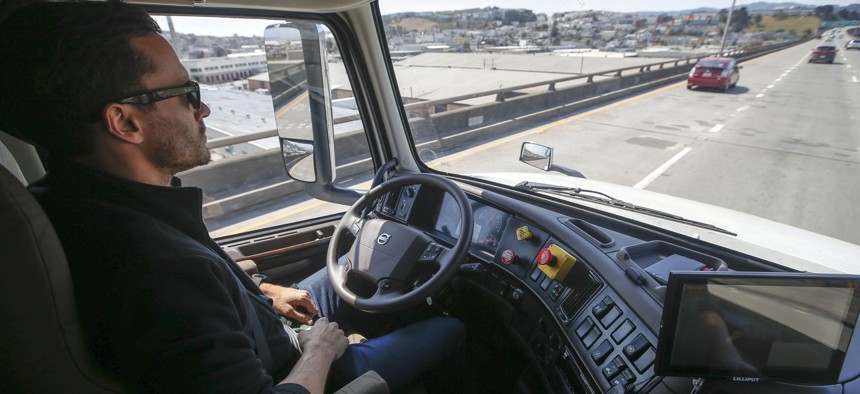Connecting state and local government leaders
“I would argue that it makes sense not to have two safety standards out there,” says the top Republican on the Senate Commerce Committee. But not everyone is so sure.
WASHINGTON — Safety and the possible displacement of truck-driving jobs by robotic technology are among the top concerns as congressional lawmakers weigh the risks and benefits of self-driving big rigs traveling on the nation’s highways.
Discussions about the topic are unfolding as Congress seeks to develop new, national standards for automated vehicles. Whether any final legislation will include commercial trucks, or just lighter weight vehicles, remains an open question.
The U.S. House last week passed a self-driving vehicle bill that did not include trucks. Draft legislation the Senate Commerce Committee is now considering leaves the issue unsettled. Key Republicans and Democrats on the panel are divided over the truck provisions.
U.S. Sen. John Thune, the South Dakota Republican who chairs the committee, told reporters after the panel met Wednesday, that the expert testimony senators had heard, in his view, pointed to the need to have trucks addressed in the legislation.
“I would argue that it makes sense not to have two safety standards out there, one for trucks and one for automobiles,” he said during the hearing.
U.S. Sen. Gary Peters, a Michigan Democrat, wasn’t so sure.
“We have not gotten as clear of an understanding on issues related to self-driving trucks as we have during our countless discussions on self-driving cars,” Peters said. “As a result, I am of the mind that highly-automated trucks are not ripe for inclusion in this bill.”
Asked later if he saw a bipartisan path for including trucks in the emerging legislation, or another bill, he replied, “I think we still have to have more discussions on it” and said he “can’t come to that conclusion at this point.” He noted concerns related to safety and the displacement of driving jobs.
Thune indicated a possible timeline for the Senate legislation would be to get it filed and marked-up before Columbus Day, in early October.
“I’m hoping we can work with Democrats to find the right balance,” he said. The senator also said he believed the reason the House did not address trucks in its bill had to do with “jurisdictional” issues involving which committees had a role in crafting the legislation.
“That’s, I think, why they didn’t address the issue in their bill,” Thune said. “I think ultimately they realize like we do that we’re going to have to deal with the trucking issue, too, in some fashion.”
Trucking industry groups contend that the legislation should cover commercial trucks. The International Brotherhood of Teamsters, the nation’s largest labor union for truck drivers, disagrees, citing threats to jobs and potential safety risks.
“We need the data from real life, in-hands-use by real customers, to understand what the proper validation processes and practices will be, or what the engineering problems are,” Troy Clarke, CEO of the truckmaker Navistar, told the Commerce Committee.
“We see no reason why commercial trucks should move forward in this area at a different speed, or under a different timetable, than light vehicles,” he added.
Ken Hall, general secretary-treasurer for the Teamsters offered a different perspective. “To have a tractor trailer going down a road without a driver, which is what I believe is coming,” Hall said, “I think there is lots of reasons why we should be concerned about that.”
The Teamsters official mentioned worries about cybersecurity, how self-driving trucks would safely maneuver in drop-yards, and how driver training requirements would be updated as high-tech rigs are put into service.
“And we haven’t gotten to the largest issue of them all, the potential impact on the livelihoods and wages of millions of your constituents,” Hall added in his comments to the committee.
But Chris Spear, president and CEO of the American Trucking Associations, said so-called “Level 5” trucks, which would not have steering wheels or pedals, and would require no guidance by a human driver, are still “decades away.”
He said the industry is currently concentrating on “driver assist” technologies, which would mainly be used on long-haul routes. In the near-term, according to Spear, “the driver’s still going to be in the seat” and will play a role in pick-ups, deliveries and navigating city streets.
“Quite frankly, we don’t view it as a displacement issue,” Spear added.
He noted that the trucking sector currently has a shortage of about 50,000 drivers. “If that trend continues, it’ll be double in five years,” he said. “We’re pushing hard to bring more talent into the industry.”
Bill Lucia is a Senior Reporter for Government Executive's Route Fifty and is based in Washington, D.C.
NEXT STORY: Goosing flash for more efficient data centers




